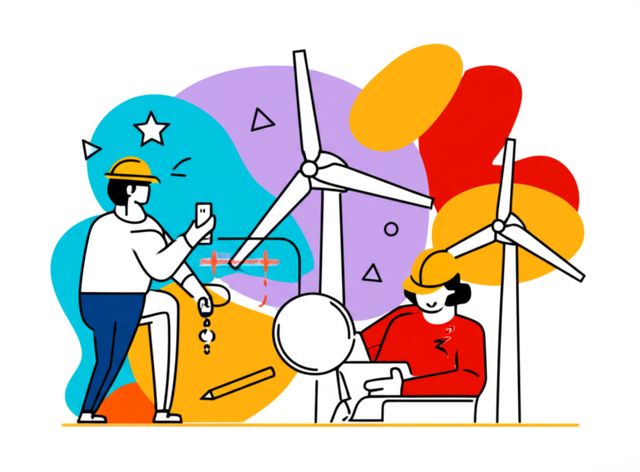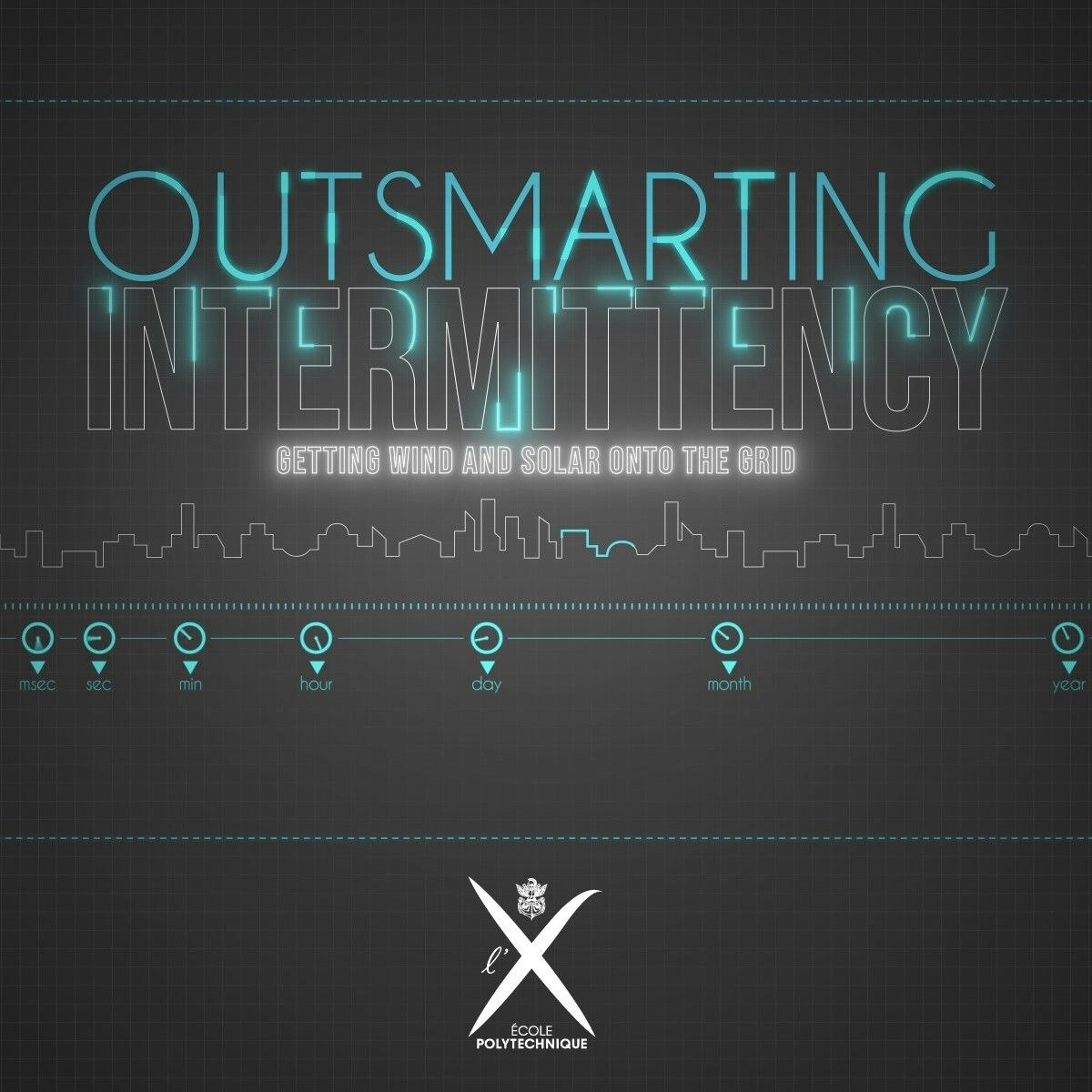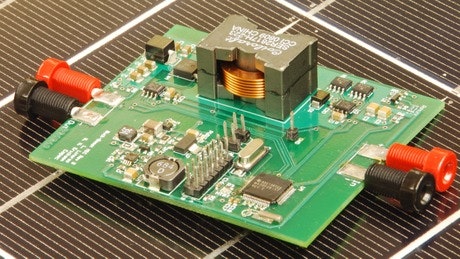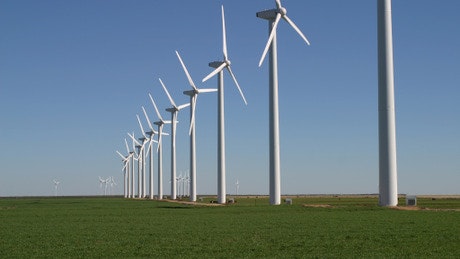Wind Energy Engineer
A Comprehensive Guide to Becoming a Wind Energy Engineer
Wind energy engineering focuses on harnessing the power of wind to generate electricity. Engineers in this field design, develop, build, and maintain the complex systems required for wind power generation, from individual turbines to large-scale wind farms. They apply principles from various engineering disciplines, including mechanical, electrical, civil, and environmental engineering, to create efficient and sustainable energy solutions.
Working as a wind energy engineer can be incredibly rewarding. You'll be at the forefront of the transition to renewable energy, contributing directly to a cleaner future. The role often involves a mix of office-based design and analysis work with hands-on fieldwork, providing variety and the chance to see projects come to life. Tackling challenges like optimizing turbine performance and integrating wind power into existing grids offers continuous intellectual stimulation.
Introduction to Wind Energy Engineering
What is Wind Energy Engineering?
Wind energy engineering is a specialized field dedicated to converting wind's kinetic energy into electrical power. Professionals apply scientific and engineering principles to every stage of a wind energy project's lifecycle. This includes assessing potential sites for wind resources, designing and manufacturing wind turbines, overseeing construction and installation, managing operations and maintenance, and eventually decommissioning facilities.
The scope is broad, encompassing aerodynamics, materials science, structural engineering, electrical systems, control systems, and environmental impact assessment. Engineers work to maximize energy capture while ensuring structural integrity, reliability, and cost-effectiveness. They must also consider grid integration, balancing power supply with demand, and navigating regulatory landscapes.
Ultimately, wind energy engineers play a critical role in developing and deploying one of the fastest-growing renewable energy sources globally. Their work directly impacts efforts to reduce carbon emissions and combat climate change, making it a field with significant societal relevance.
A Brief History of Wind Power
Humans have harnessed wind power for millennia, initially for sailing ships and later for grinding grain and pumping water using windmills. The concept of using wind to generate electricity emerged in the late 19th century, with early pioneers like Charles F. Brush in the US and Poul la Cour in Denmark building rudimentary wind turbines.
Significant development accelerated in the late 20th century, spurred by energy crises and growing environmental awareness. Government incentives and research programs led to larger, more efficient turbine designs. Technology rapidly advanced from small, kilowatt-scale machines to the multi-megawatt turbines common today, featuring sophisticated aerodynamics, materials, and control systems.
Offshore wind farms represent the latest frontier, tapping stronger, more consistent winds over the ocean. Continuous innovation focuses on increasing turbine size, improving efficiency, reducing costs, and developing solutions like floating platforms for deep-water deployment, pushing the boundaries of what's possible in wind energy generation.
For those interested in the historical context and foundational principles, these books offer valuable insights.
The Role in the Renewable Energy Transition
Wind energy engineers are central figures in the global shift away from fossil fuels towards sustainable energy sources. Wind power is a key pillar of decarbonization strategies worldwide, offering a clean, abundant, and increasingly cost-competitive alternative to conventional power generation. Engineers in this field directly contribute by making wind energy more efficient, reliable, and accessible.
Their work involves overcoming technical hurdles to integrate variable wind power into electrical grids smoothly. This includes developing advanced forecasting methods, energy storage solutions, and smart grid technologies. By optimizing turbine design and placement, they maximize energy output while minimizing environmental impact.
As nations strive to meet climate goals, the demand for skilled wind energy engineers continues to grow. They are essential not only for deploying new wind capacity but also for innovating the next generation of technologies needed to achieve a fully renewable energy future.
Understanding the broader energy landscape is helpful. These courses provide context on renewable energy and climate change.
Key Industries and Employers
Wind energy engineers find employment across a diverse range of organizations involved in the wind power sector. Major employers include wind turbine manufacturers, who design and produce the turbines themselves, requiring engineers for research, development, design, and production roles.
Energy utility companies and independent power producers develop, own, and operate wind farms, hiring engineers for site assessment, project management, grid integration, and operations and maintenance. Engineering consulting firms also play a significant role, providing specialized expertise in areas like feasibility studies, environmental assessments, and detailed design work for various clients.
Additionally, research institutions and government agencies employ engineers to advance wind energy technology, develop standards, and shape energy policy. The growing offshore wind sector is creating further opportunities with specialized companies focusing on marine engineering, foundation design, and offshore logistics.
Key Responsibilities of Wind Energy Engineers
Turbine Design and Optimization
A core responsibility for many wind energy engineers is the design and continuous improvement of wind turbines. This involves applying principles of aerodynamics to optimize blade shapes for maximum energy capture across different wind speeds. Structural engineers ensure the tower, nacelle, and blades can withstand dynamic loads from wind, rotation, and environmental factors.
Engineers work with advanced materials like composites to create lightweight yet durable components. They also design and refine control systems that adjust blade pitch and turbine yaw to maximize power output and protect the turbine during high winds or grid disturbances. Ongoing optimization efforts focus on increasing efficiency, reliability, and lifespan while reducing manufacturing and maintenance costs.
Computational tools, particularly Computational Fluid Dynamics (CFD) and Finite Element Analysis (FEA), are essential for modeling airflow, structural stress, and overall turbine performance during the design phase. Simulation plays a vital role in testing new concepts before physical prototyping.
These courses delve into the fundamentals and tools used in turbine design and analysis.
Site Feasibility Analysis
Before a wind farm can be built, engineers must conduct thorough site feasibility studies. This involves assessing the wind resource potential at a proposed location using meteorological data, typically collected over at least a year from measurement masts or remote sensing devices like LiDAR.
Engineers analyze this data to understand wind speed distribution, direction, turbulence, and seasonal variations. This information is crucial for estimating the potential energy production (yield assessment) of different turbine types and layouts. They use specialized software to model wind flow across the terrain and predict turbine wakes' impact on overall farm efficiency.
Beyond the wind resource, feasibility studies also evaluate geological conditions for foundation design, grid connection availability and capacity, environmental impacts (on wildlife, noise levels, visual aesthetics), land use constraints, transportation logistics for large components, and local regulations. A comprehensive analysis ensures the project is technically viable, economically sound, and environmentally responsible.
This book provides insights into meteorological aspects critical for site assessment.
Grid Integration Challenges
Integrating large amounts of wind power into the electrical grid presents unique engineering challenges. Wind is an intermittent energy source; its availability fluctuates based on weather patterns, unlike traditional power plants that offer predictable, controllable output. Engineers must develop strategies to manage this variability and ensure grid stability.
This involves designing sophisticated control systems for wind farms to regulate voltage and frequency, helping to stabilize the grid. Accurate wind power forecasting is essential for grid operators to anticipate supply changes and schedule other generation sources accordingly. Power electronics, such as converters within turbines, play a vital role in conditioning the generated power to meet grid requirements.
Transmission infrastructure often needs upgrades to transport power from remote, windy locations to population centers. Energy storage solutions, like batteries, are increasingly explored to smooth out wind power fluctuations and provide power during low-wind periods. Addressing these integration challenges is critical for maximizing the contribution of wind energy.
These courses touch upon grid integration and power electronics relevant to wind energy.
Maintenance and Lifecycle Management
Ensuring the long-term performance and safety of wind turbines requires diligent maintenance and lifecycle management. Wind energy engineers develop maintenance strategies, often incorporating condition monitoring systems that use sensors to detect potential faults in components like gearboxes, generators, and blades before they lead to failure.
Maintenance activities range from routine inspections and lubrication to complex repairs, sometimes requiring specialized technicians working at height or offshore. Engineers analyze operational data to optimize maintenance schedules, predict component lifespan, and identify areas for design improvement based on real-world performance.
Lifecycle management also encompasses planning for the end-of-life phase of wind turbines. This includes developing cost-effective and environmentally sound methods for decommissioning turbines and recycling or repurposing components like blades, which pose a particular challenge due to their composite material construction.
Formal Education Pathways
Relevant Undergraduate Degrees
A bachelor's degree in engineering is typically the minimum requirement to enter the wind energy field. Mechanical Engineering is a very common pathway, providing a strong foundation in fluid mechanics, thermodynamics, materials science, and structural analysis – all crucial for turbine design and operation.
Electrical Engineering is another highly relevant degree, focusing on power generation, control systems, grid integration, and power electronics. Many wind energy roles, particularly those involving generators, converters, and grid connection, require this expertise.
Other relevant undergraduate degrees can include Aerospace Engineering (due to the importance of aerodynamics), Civil Engineering (for foundation design and site infrastructure), and Environmental Engineering (for impact assessment and siting). Some universities are now offering specialized degrees or concentrations in renewable or sustainable energy engineering, which provide a more targeted curriculum.
Specialized Graduate Programs
While a bachelor's degree can open doors to entry-level positions, pursuing a master's or doctoral degree allows for deeper specialization and can lead to more advanced research, design, or management roles. Many universities worldwide offer graduate programs specifically focused on wind energy or renewable energy systems.
These programs delve into advanced topics such as turbine aerodynamics, advanced control strategies, offshore wind engineering, structural dynamics of large turbines, power system stability with high renewable penetration, and wind resource modeling. Research-focused degrees (like a Ph.D.) often involve contributing to cutting-edge developments in the field.
A graduate degree can be particularly beneficial for those seeking roles in research and development, specialized consulting, or academia. It demonstrates a high level of expertise and commitment to the field. Online master's programs are also becoming available, offering flexibility for working professionals.
These courses offer foundational knowledge often covered in specialized programs.
Research Opportunities
The wind energy sector thrives on continuous innovation, creating numerous research opportunities for engineers. Universities, national laboratories (like NREL in the US or DTU Wind Energy in Denmark), and R&D departments within private companies are hubs for this research. Key areas include advanced fluid dynamics to improve aerodynamic efficiency and understand complex flow phenomena around turbines and within wind farms.
Materials science research focuses on developing stronger, lighter, more durable materials for blades and other components, as well as exploring sustainable materials and recycling methods. Research in control systems aims to enhance energy capture, reduce structural loads, and improve grid support capabilities. Offshore wind presents unique research challenges related to floating foundations, mooring systems, corrosion resistance, and installation logistics in harsh marine environments.
Other active research areas include improving wind forecasting accuracy, developing digital twins for predictive maintenance, exploring airborne wind energy concepts, and integrating energy storage. Engaging in research, perhaps through internships, graduate studies, or R&D roles, allows engineers to contribute directly to the future of wind technology.
Accreditation and Certification
In many countries, practicing as a professional engineer requires licensure or chartership, often involving graduation from an accredited engineering program and passing competency exams. Accreditation bodies (like ABET in the US or Engineers Ireland) ensure that university programs meet rigorous educational standards.
While specific "Wind Energy Engineer" licenses are uncommon, obtaining a Professional Engineer (PE) license or equivalent in a core discipline like Mechanical or Electrical Engineering is highly valuable and often required for senior roles, especially those involving public safety or signing off on designs.
Beyond formal licensure, various organizations offer specialized certifications related to wind energy or renewable energy technologies. These certifications can demonstrate specific expertise in areas like wind resource assessment, turbine maintenance, or project management within the wind sector. While not always mandatory, they can enhance career prospects and show commitment to professional development.
Essential Technical Skills
Computational Fluid Dynamics (CFD)
Computational Fluid Dynamics (CFD) is a powerful tool used extensively in wind energy engineering. It involves using numerical methods and algorithms to simulate fluid flow, in this case, air moving around and through wind turbines. Engineers use CFD software to analyze aerodynamic performance, predict power output, and study the complex wake interactions between turbines in a wind farm.
CFD simulations help optimize blade designs for better efficiency and reduced noise. They are also used to assess wind conditions at potential sites by modeling airflow over complex terrain. Proficiency in using industry-standard CFD software packages (like ANSYS Fluent, OpenFOAM, or STAR-CCM+) is a highly sought-after skill.
Understanding the underlying principles of fluid mechanics and numerical methods is essential to set up simulations correctly and interpret the results meaningfully. While complex, mastering CFD allows engineers to test designs virtually, reducing the need for expensive physical prototypes and wind tunnel testing.
These courses provide introductions to fluid mechanics and CFD applications relevant to wind energy.
Structural Load Analysis
Wind turbines are massive structures subjected to significant and complex forces. Engineers must perform detailed structural load analysis to ensure the tower, foundation, nacelle, and blades can withstand aerodynamic forces from wind, gravitational loads, and operational loads from rotation and control actions throughout their intended lifespan.
This involves using principles of solid mechanics and structural dynamics, often employing Finite Element Analysis (FEA) software. Engineers model the turbine components and simulate how they respond to various load cases, including extreme weather events like storms and turbulent wind conditions. The goal is to ensure structural integrity, prevent fatigue failure, and optimize designs for material usage and cost.
Understanding international design standards (like IEC 61400) is crucial for performing these analyses correctly. Load analysis informs material selection, component sizing, and the design of foundations, which must safely transfer all loads to the ground (or seabed for offshore turbines).
These courses cover structural concepts and wind load calculations.
Energy Yield Assessment Tools
Accurately predicting the energy output of a proposed wind farm is critical for its financial viability. Wind energy engineers use specialized software tools for energy yield assessment (EYA). These tools combine long-term wind resource data with turbine power curve information and models of various energy losses.
Loss factors considered in EYA include turbine wake effects (where downwind turbines experience reduced wind speed), electrical losses in cables and transformers, turbine availability (downtime for maintenance), blade degradation, curtailment due to grid constraints, and site-specific factors like icing or high turbulence. Engineers run simulations using software like WindPRO, OpenWind, or WindFarmer to estimate the net annual energy production (AEP).
Proficiency in these tools and understanding the uncertainties associated with each input parameter are key skills. The EYA report is a crucial document used by developers, investors, and lenders to evaluate the economic feasibility of a wind project.
SCADA Systems Operation
Supervisory Control and Data Acquisition (SCADA) systems are the nerve centers of modern wind farms. They allow operators to monitor the real-time performance of individual turbines and the entire facility, collect vast amounts of operational data, and remotely control turbine functions.
Wind energy engineers, particularly those in operations and maintenance roles, need to understand how SCADA systems work. This includes interpreting data on power output, wind speed, component temperatures, vibration levels, and fault logs to assess turbine health and diagnose problems. They use SCADA data to optimize performance, schedule maintenance, and generate reports.
Familiarity with SCADA software interfaces and the underlying communication protocols is important. Analyzing historical SCADA data can also provide valuable insights for improving turbine control strategies, predicting failures, and informing future designs. Some roles may involve configuring or troubleshooting SCADA systems themselves.
Career Progression and Opportunities
Entry-Level vs. Senior Positions
Entry-level roles for wind energy engineers often involve supporting senior engineers on specific tasks. This might include data analysis, assisting with design calculations, preparing technical drawings, participating in site visits, or helping with report writing. These roles provide essential hands-on experience and exposure to different aspects of wind projects.
As engineers gain experience and expertise, they progress to senior positions with greater responsibility. Senior engineers might lead design teams, manage complex analyses (like CFD or load calculations), oversee specific project phases (like construction or commissioning), or specialize in areas like grid integration or turbine technology.
Senior roles typically require strong technical skills, project management capabilities, problem-solving abilities, and often, professional licensure (like a PE). Leadership, communication, and mentoring skills also become increasingly important as engineers advance in their careers.
Specialization Paths (Offshore vs. Onshore)
Within wind energy engineering, several specialization paths exist. One major distinction is between onshore and offshore wind. Onshore wind farms are built on land, while offshore farms are situated in bodies of water, typically oceans or large lakes.
Offshore wind engineering presents unique challenges due to the marine environment. Engineers specializing in this area deal with foundation design for water depths (fixed-bottom or floating), corrosion protection, subsea cable installation, and logistics for construction and maintenance using specialized vessels. The turbines themselves are often larger than onshore models.
Other specializations can focus on specific technical areas like aerodynamics, control systems, materials science, electrical systems, or geotechnical engineering (for foundations). Engineers might also specialize in particular project phases, such as site assessment, manufacturing, construction management, or operations and maintenance.
This book provides insights specifically into offshore wind cost modeling.
Transition to Project Management
With experience, many wind energy engineers transition into project management roles. Wind energy projects are complex undertakings involving large budgets, tight schedules, multiple stakeholders, and diverse teams of specialists. Effective project management is crucial for successful delivery.
Engineers moving into these roles leverage their technical understanding to oversee project planning, scheduling, budgeting, risk management, procurement, and coordination of various activities from site development through construction and commissioning. Strong leadership, communication, negotiation, and organizational skills are essential for project managers.
Certifications like the Project Management Professional (PMP) can be beneficial for those pursuing this path. Project managers ensure that wind farms are built safely, on time, within budget, and meet technical specifications and performance expectations.
Consulting Opportunities
Experienced wind energy engineers often find opportunities in consulting firms. These firms provide specialized expertise and independent advice to developers, investors, utilities, manufacturers, and government agencies involved in wind energy projects. Consultants might work on feasibility studies, technical due diligence, owner's engineering, policy analysis, or specialized technical problem-solving.
Consulting roles require deep technical knowledge in one or more areas of wind energy, combined with strong analytical and communication skills. Consultants must be able to understand client needs, conduct thorough assessments, and present findings clearly and concisely in reports and presentations.
Working in consulting offers exposure to a wide variety of projects and challenges, providing a broad perspective on the industry. It often involves working with different clients and technologies, making it a dynamic career path for engineers seeking variety and intellectual stimulation.
Industry Trends and Market Outlook
Staying informed about industry trends is vital for career planning in wind energy. The global wind power market continues to expand rapidly, driven by climate change concerns, falling technology costs, and supportive government policies. Significant growth is anticipated in both established and emerging markets.
Growth Projections and Emerging Markets
Global installed wind capacity is projected to grow significantly in the coming decades. While established markets in Europe, North America, and China continue to add substantial capacity, many emerging economies in Asia, Latin America, and Africa are increasingly investing in wind power to meet growing energy demand and diversify their energy mix.
According to the Global Wind Energy Council (GWEC), market forecasts show continued strong growth, although policy certainty remains a key factor influencing investment levels. Offshore wind, in particular, is poised for exponential growth as more countries tap into its vast potential. This global expansion creates diverse geographical opportunities for wind energy professionals. You can explore detailed market insights from organizations like the GWEC Global Wind Report.
The U.S. Bureau of Labor Statistics projects very strong growth for wind turbine technicians, an indicator of the overall health and expansion of the wind energy sector, which requires engineering support across the board.
Floating Turbine Innovations
A major technological frontier is floating offshore wind turbines. Unlike traditional offshore turbines fixed to the seabed, floating platforms allow deployment in much deeper waters, unlocking vast wind resources further from shore. Significant innovation is focused on developing cost-effective and reliable floating foundation designs (such as spar-buoy, semi-submersible, and tension-leg platforms) and mooring systems.
Demonstration projects and the first commercial-scale floating wind farms are emerging, paving the way for wider adoption. Engineers are tackling challenges related to dynamic stability, installation complexity, and maintenance access for these floating structures. Success in this area could dramatically increase the global potential for offshore wind power.
Research and development continue to drive down costs and improve the performance of floating wind technology, making it a key area to watch for future engineering challenges and opportunities.
Policy Impacts on Sector Growth
Government policies play a crucial role in shaping the wind energy market. Incentives like tax credits, feed-in tariffs, and renewable portfolio standards have historically driven investment. Auctions for wind power contracts provide revenue certainty for developers. Supportive permitting processes and investments in grid infrastructure are also vital enablers.
Conversely, policy uncertainty or abrupt changes can hinder growth and investment. International agreements on climate change, like the Paris Agreement, provide long-term signals, but national-level implementation varies. Engineers need to be aware of the regulatory landscape in the regions where they work, as policies directly impact project economics and timelines.
Energy policy analysis is becoming an important aspect of the field, linking engineering realities with economic and political drivers. Understanding these dynamics helps engineers contribute to informed decision-making and advocacy for supportive policies.
Supply Chain Challenges
The rapid growth of the wind industry has put pressure on global supply chains. Manufacturing key components like turbine blades, nacelles, towers, and specialized components for offshore foundations requires significant industrial capacity. Sourcing raw materials, such as rare earth elements used in some generator magnets, can also present challenges.
Logistics are complex, involving the transportation of massive turbine components over long distances, often requiring specialized vehicles and vessels. Workforce development is another critical aspect, ensuring enough skilled technicians and engineers are available to build, install, and maintain the growing fleet of turbines.
Recent global events have highlighted supply chain vulnerabilities. The industry is working to build more resilient and localized supply chains, invest in manufacturing capacity, and address workforce bottlenecks to sustain its growth trajectory. Engineers play a role in optimizing manufacturing processes and logistics planning.
Environmental and Safety Considerations
Wildlife Impact Mitigation
While wind energy is clean, the potential impact of turbines on wildlife, particularly birds and bats, is an important consideration. Wind energy engineers work with environmental scientists to assess potential risks during site selection and develop mitigation strategies. This can involve careful siting of turbines away from major migratory routes or sensitive habitats.
Operational strategies are also employed, such as temporary turbine shutdowns during periods of high bat activity or using deterrent technologies. Ongoing research focuses on improving our understanding of wildlife interactions with turbines and developing more effective mitigation measures, like smart curtailment systems based on real-time monitoring.
Balancing renewable energy development with biodiversity conservation is a key aspect of sustainable wind energy deployment. Engineers contribute by incorporating environmental considerations into project design and operation.
Noise Pollution Management
Wind turbines generate noise, primarily aerodynamic noise from the blades moving through the air and, to a lesser extent, mechanical noise from the gearbox and generator. While modern turbines are designed to be much quieter than older models, noise levels are still a factor in siting decisions, especially near residential areas.
Engineers work on designing quieter blades and nacelles. Noise modeling is conducted during the site assessment phase to predict sound levels at nearby properties and ensure compliance with local regulations. Careful turbine layout and operational adjustments (like reducing rotor speed under certain conditions) can help manage noise impacts.
Ongoing research aims to further reduce turbine noise at the source through advanced aerodynamic designs and control strategies. Addressing noise concerns effectively is important for maintaining public acceptance of wind energy projects.
Extreme Weather Resilience
Wind turbines must be designed to withstand the extreme weather conditions they might encounter over their operational life. This includes high winds from storms or hurricanes, heavy icing, lightning strikes, and seismic activity in some regions. Engineers perform detailed load calculations based on site-specific meteorological and geological data.
Design standards mandate specific resilience requirements. Turbines incorporate features like robust structural components, sophisticated control systems that automatically shut down or adjust operation during extreme events, and lightning protection systems. For offshore turbines, wave loading and storm surges add further complexity to resilience design.
Ensuring turbines can safely endure extreme weather is paramount for safety, reliability, and project economics. Climate change may also increase the frequency or intensity of some extreme weather events, requiring engineers to factor future climate projections into their designs.
Meteorology plays a key role here. These books cover atmospheric dynamics relevant to weather phenomena.
Decommissioning Protocols
Wind turbines typically have an operational lifespan of 20-30 years. Planning for decommissioning – the process of dismantling and removing turbines at the end of their life – is an increasingly important aspect of lifecycle management. Engineers are involved in developing safe, efficient, and environmentally responsible decommissioning strategies.
This includes planning the logistics of disassembly and removal of large components. A major focus is on recycling and waste management, particularly for turbine blades made from composite materials, which are challenging to recycle. Research is underway to develop more recyclable blade materials and processes for breaking down existing composites.
Regulations often require site restoration after decommissioning, returning the land to its previous state. Proper planning ensures that the end-of-life phase is managed sustainably, minimizing environmental impact and potentially recovering valuable materials.
Global Workforce Dynamics
Regional Demand Hotspots
While the wind industry is global, demand for engineers and technicians is currently concentrated in regions with significant wind energy deployment and development pipelines. Historically, Europe (particularly Germany, Spain, Denmark, UK), North America (USA), and China have been major hubs.
New hotspots are emerging rapidly as offshore wind expands (e.g., Northeast US, North Sea regions, East Asia) and as large onshore markets develop in countries like India, Brazil, Australia, and parts of Africa and Southeast Asia. Job opportunities often follow investment trends and policy support.
Engineers willing to relocate or work internationally may find expanded opportunities in these growing markets. Understanding regional market dynamics can help guide career planning and job searching.
Cross-Border Certification Requirements
Working internationally as a wind energy engineer may involve navigating different professional certification and licensure requirements. While core engineering principles are universal, specific regulations, design codes, and safety standards can vary significantly between countries.
Some countries or regions have mutual recognition agreements for engineering qualifications, simplifying the process for engineers trained elsewhere. However, in many cases, engineers may need to undergo additional assessments or meet specific local requirements to practice legally, particularly for roles requiring professional licensure.
Similarly, safety certifications (e.g., GWO Basic Safety Training for working on turbines) are often required and need to be recognized in the region of work. Researching the specific requirements of a target country or region is essential for engineers considering international opportunities.
Cultural Adaptation in Multinational Projects
Wind energy projects often involve multinational teams, bringing together engineers, technicians, managers, and stakeholders from diverse cultural backgrounds. Working effectively in such environments requires cultural sensitivity, strong communication skills, and an ability to adapt to different working styles and norms.
Understanding potential differences in communication approaches, decision-making processes, and professional etiquette can help prevent misunderstandings and build stronger working relationships. Flexibility, respect, and an open mind are key attributes for success in international project settings.
Experience working on diverse teams is increasingly valuable in the globalized wind industry. Language skills can also be a significant advantage when working on international projects or for multinational companies.
Localization vs. Globalization Tensions
The wind industry experiences ongoing tension between globalization and localization. Globalized supply chains offer economies of scale and access to specialized manufacturing, but can be vulnerable to disruptions and geopolitical issues. Leading turbine manufacturers operate globally, standardizing designs to reduce costs.
Conversely, there is increasing pressure for localization – developing local manufacturing capacity, supply chains, and workforces within specific countries or regions. This is driven by governments seeking local economic benefits (jobs, investment) from wind energy development and by efforts to enhance supply chain resilience.
This dynamic impacts engineering roles, influencing where manufacturing, R&D, and project execution activities are centered. Engineers may find opportunities related to technology transfer, setting up local production facilities, or adapting global designs to meet local requirements and standards.
Frequently Asked Questions
What are the typical salary ranges for Wind Energy Engineers?
Salaries for wind energy engineers vary based on factors like experience level, education, specific role, employer type (manufacturer, developer, consultant), and geographic location. Entry-level positions typically offer competitive engineering salaries, reflecting the demand for skilled professionals in this growing field.
Mid-career and senior engineers with specialized expertise or management responsibilities can command significantly higher salaries. Compensation often includes base salary plus potential bonuses tied to project success or company performance. According to the U.S. Bureau of Labor Statistics, electrical engineers (a common background) earned a median annual wage of $107,930 in May 2023, providing a general benchmark, though specific wind energy roles may differ.
Researching salary data specific to wind energy roles in your target region using resources like industry surveys or job boards (and considering cost of living) will provide the most accurate picture.
How does demand fluctuate with policy changes?
Demand for wind energy engineers is closely linked to the overall health and growth rate of the wind industry, which, in turn, is significantly influenced by energy policies. Supportive policies like tax incentives, renewable targets, and streamlined permitting processes tend to boost investment and project development, increasing demand for engineers.
Conversely, policy uncertainty, reduction or expiration of incentives, or unfavorable regulatory changes can lead to slowdowns in project development and potentially dampen hiring demand in the short-to-medium term. Long-term demand trends remain strong due to climate goals, but short-term fluctuations tied to policy cycles are a characteristic of the industry.
Engineers should stay aware of policy developments affecting the sector. Diversifying skills and being adaptable can help navigate potential fluctuations in specific market segments or regions.
What is the balance between fieldwork and office work?
The balance between fieldwork and office work varies greatly depending on the specific role. Design engineers, analysts, and simulation specialists may spend most of their time in the office working with computer-aided design (CAD), CFD, FEA, or EYA software.
Project engineers, construction managers, and commissioning engineers typically spend a significant portion of their time on-site overseeing installation, testing, and handover of wind farms. Operations and maintenance engineers also have a substantial field component, involving turbine inspections and repairs, often requiring work at heights or in remote/offshore locations.
Roles in research, consulting, or project development might involve a mix, with periods of office-based work interspersed with site visits for data collection, meetings, or inspections. Consider your preference for hands-on fieldwork versus office-based analysis when exploring different career paths within wind energy.
Can I transition from traditional power engineering?
Yes, transitioning from traditional power engineering (e.g., fossil fuels, nuclear) to wind energy is certainly possible and increasingly common. Many core engineering skills are transferable. Electrical engineers from conventional power backgrounds possess relevant knowledge of power systems, grid integration, generators, and substations.
Mechanical engineers have transferable skills in rotating machinery, thermodynamics, and structural analysis. However, specific knowledge related to wind turbine technology, aerodynamics, wind resource assessment, and relevant software tools will likely need to be acquired.
Pursuing targeted online courses, professional development workshops, or even a specialized graduate certificate can bridge knowledge gaps. Highlighting transferable skills and demonstrating enthusiasm for renewable energy are key when making the transition. Many companies value the experience engineers bring from other parts of the energy sector.
These introductory and specialized courses can help bridge the gap.
How might Artificial Intelligence impact design processes?
Artificial Intelligence (AI) and machine learning (ML) are beginning to impact wind energy engineering, particularly in design and operations. AI algorithms can analyze vast datasets from simulations and operating turbines to identify patterns and optimize designs more rapidly than traditional methods.
AI can be used to improve wind resource forecasting accuracy, optimize wind farm layouts to minimize wake losses, and develop more sophisticated turbine control strategies that adapt to changing conditions in real-time. In operations, ML is used for predictive maintenance, analyzing sensor data to anticipate component failures before they occur.
While AI won't replace engineers, it will become an increasingly powerful tool. Engineers will need to develop skills in data analysis and learn how to leverage AI tools effectively to enhance design processes, improve operational efficiency, and accelerate innovation in the field.
What are the long-term career sustainability concerns?
The long-term career outlook for wind energy engineers appears very positive, driven by the global imperative to transition to renewable energy sources to combat climate change. Wind power is a mature, cost-effective technology expected to play a major role in future energy systems for decades to come.
While policy fluctuations can cause short-term market volatility, the underlying drivers for growth remain strong. Continuous innovation is needed in areas like offshore wind, energy storage integration, and turbine recycling, ensuring ongoing demand for skilled engineers.
As with any field, continuous learning and adaptation are key to long-term career sustainability. Staying updated with technological advancements, developing complementary skills (like data analysis or project management), and being adaptable to evolving market needs will position engineers for sustained success in this dynamic and growing sector.
Embarking on Your Wind Energy Journey
Pursuing a career as a wind energy engineer offers the chance to apply your technical skills to one of the most pressing challenges of our time: building a sustainable energy future. It's a field that combines rigorous engineering principles with a tangible impact on the environment and society.
The path requires a solid educational foundation, a commitment to continuous learning, and the development of specialized technical skills. Whether you are a student exploring options, a professional considering a pivot, or someone already in the industry seeking advancement, resources abound to support your journey. Platforms like OpenCourser provide access to a wide range of engineering courses, including those specifically focused on sustainability and renewable energy, allowing you to build foundational knowledge or specialize further.
While the field presents complex challenges, the rewards of contributing to clean energy innovation are substantial. Embrace the learning process, connect with professionals in the industry, and explore the diverse opportunities available. Your engineering skills are needed to help power the world with wind.
These foundational books can provide a strong start or supplement your existing knowledge.

















